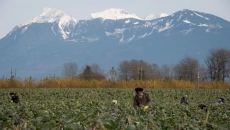Canadian teacher Christopher Maclure remembers the first time he felt afraid living in China.
Almost all the newspapers there carried stories about how angry Chinese officials were when Huawei's chief financial officer Meng Wanzhou was detained by Canadian authorities in Vancouver at the behest of the United States.
But it wasn't until a few days later when the two Canadians, Michael Kovrig and Michael Spavor, were arrested by China that Maclure felt fear.
"That's when I got really scared," he said in a phone interview from China where he has lived for more than two decades. "It was the top news story in China."
Meng has been held in Canada since December 2018. She's out on bail while fighting extradition to the United States on fraud charges. Last week, her lawyers' first round of arguments was thrown out by a B.C. judge, meaning the case continues.
Nine days after Meng's arrest, Chinese authorities sent Kovrig, an ex-diplomat working for the International Crisis Group, and Spavor, an entrepreneur who did business in North Korea, to prison. They are accused of violating China's national security interests, but Canadian argues the men have been "arbitrarily detained."
Maclure said his family was quite worried while these events played out and their fears were renewed when the B.C. court ruled against Meng last week.
But Maclure said he has felt safer in China than in any country in the West, he said.
"Everything is on camera here. It provides me with a sense of security," he said. "And I speak Chinese quite well."
Maclure said he censors what he says on WeChat, a Chinese social media site.
"Being a teacher ... I'm sometimes a little paranoid that I'd be a person to detain," he said. "We have a saying in China that when it's all the same the tallest tree gets the most wind. It means the more you express your opinion, the more critical you are, the more likely you are to get cut down."
Myriam Larouche, a Quebec woman who is a graduate student in China, said she's not worried about being affected by the Meng case. Larouche is in Canada now, but she plans to return to China once flights resume and school starts.
Larouche said she had "some concerns" when she heard the two Canadians were arrested, but "I asked some friends and they said 'No, no you don't have to be worried.' "
Global Affairs Canada said there are currently 12,885 Canadian citizens in China who have voluntarily registered with the department.
Ottawa is "aware" of 118 Canadians currently in custody in greater China with the most common charges being drug-related and fraud.
A court in southern China handed down a death penalty to a Canadian in April of last year on drug charges. In a separate drug smuggling case, China sentenced Canadian Robert Lloyd Schellenberg to death in a sudden retrial in January — one month after Kovrig and Spavor were detained.
Wayne Duplessis had been living in China for more than two decades prior to the COVID-19 pandemic and said he hopes to go back.
He remembers reading about the arrests of Meng, Kovrig and Spavor.
"A friend contacted me a couple of days after (Kovrig and Spavor were arrested) and said, 'are you concerned?' I guess there was a brief moment when I thought 'should I be concerned?' "
But that passed, Duplessis said.
He said he and his family have been treated well in China and people there have a lot of respect for Canada.
"By and large I never feel uncomfortable about this. It seems very much unrelated to us."
Duplessis said he feels badly for Spavor and Kovrig.
"I can't imagine what it would be like to be in custody for more than 500 days — even one day. Terrifying," he said
Canadians living in China can stay in touch with the embassy and cultivate "good working relationships locally," he said.
"I hope this is a blip and I hope that things get cleared."
But people can't be ruled by their fears, he added.
"We have to move forward or we just don't get anywhere. So, you try to be as cautious as you can, you try to understand the risks — there's no sense in being foolish about it — but we do have to move forward.
"We do have to build our lives."






